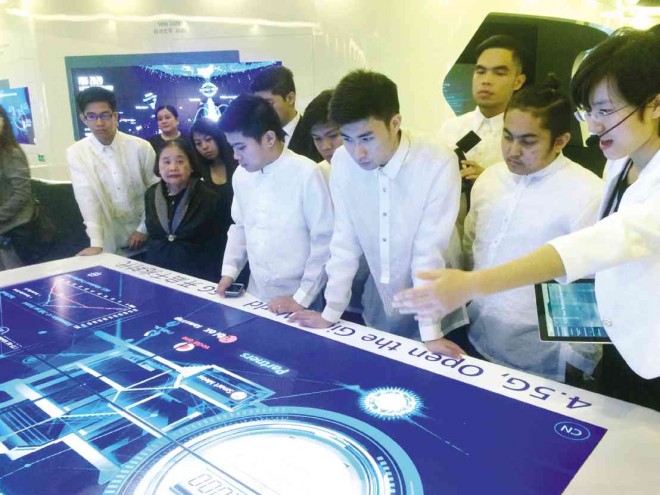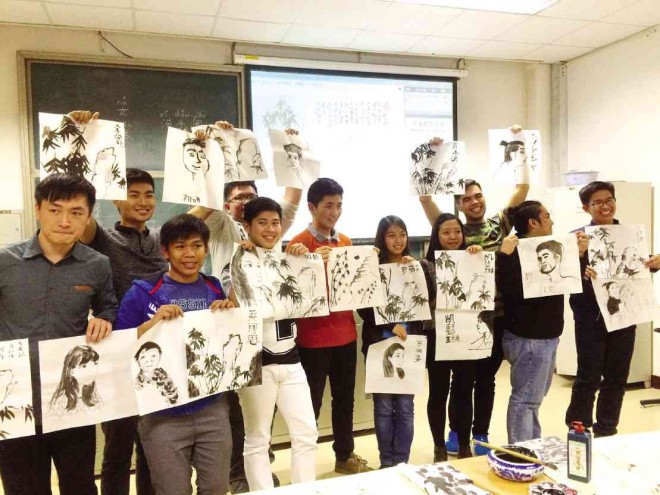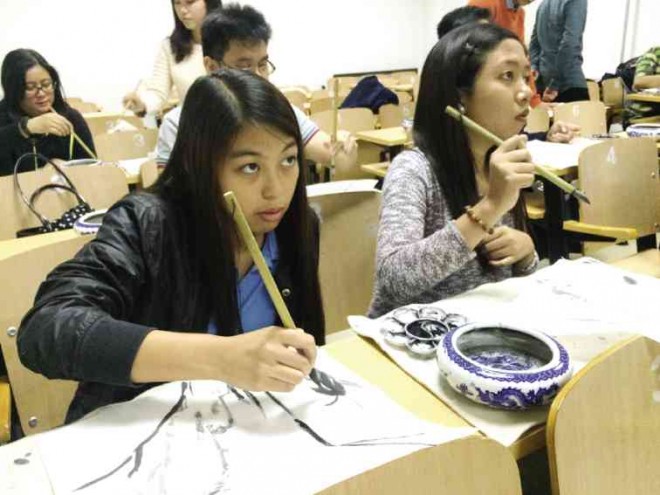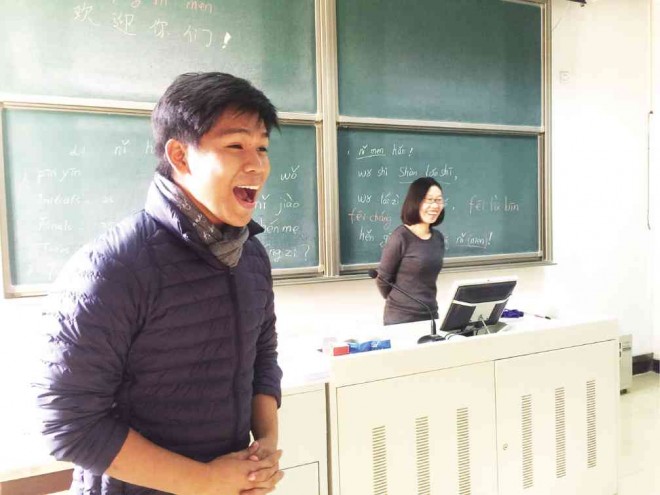China inspires young techies to stay rooted
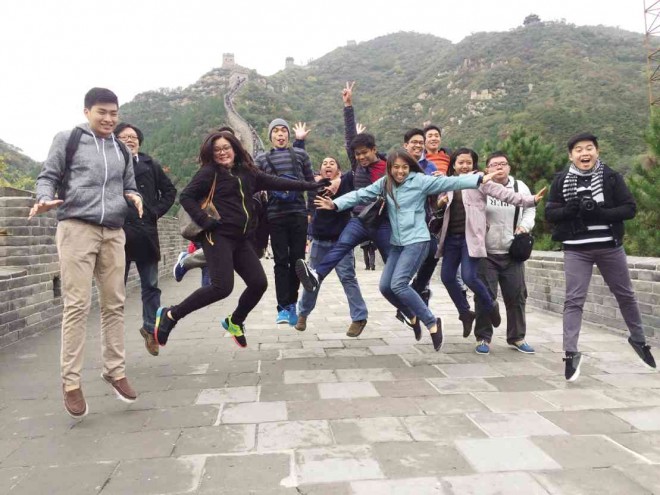
JUMPING for joy at where else but the Great Wall, one of must-see places the Huawei-sponsored group visited in Beijing.
Photos by Jovic Yee
At a time when many of the country’s best minds are leaving for better opportunities abroad, there are young Filipino students like Kyle Corpus and Robert Carlo Cruz who say they want to stay and help the Philippines achieve its long overdue progress.
The students’ passion to help move the country along may have been a result of their recent two-week study trip to Beijing and Shenzhen, China, as part of Huawei Philippines’ Seeds for the Future program.
Corpus, who describes himself as a patriot, believes his skills in information and communications technology (ICT) can greatly benefit the nation. He is a senior Computer Science student at Mapua Institute of Technology.
Cruz, a senior Information Technology (IT) student and Commission on Higher Education scholar, shares the ideals of his schoolmate Corpus. He says innovations by Filipinos should first be enjoyed by Filipinos.
Article continues after this advertisementHuawei launched Seeds for the Future in the Philippines only in December last year, but the corporate social responsibility program has been going on in more than 50 countries worldwide for the past seven years.
Article continues after this advertisementThe program aims to bridge the gap between what students learn about ICT in school and what industry needs.
Eight of the 10 students, the country’s first batch of “Seeds,” came from Mapua. The delegates underwent a selection process that took into account the students’ grades and performance during interviews.
The other Mapuans who joined Corpus and Cruz on the all-expense-paid trip from Oct. 24 to Nov. 6 were Averian Jamias, Julio Jeremy Macrohon, Lex Magtalas, John Edward Philippe Manalac, Leriza Muralla and Benner Redosendo.
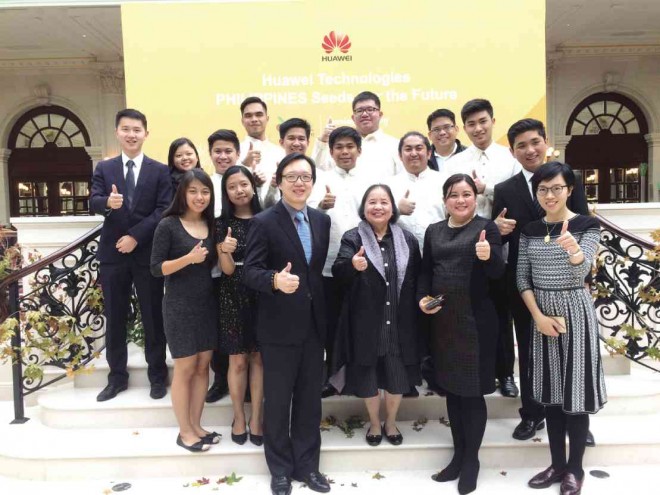
TO THE FUTURE: (front row) Muralla, Mapacpac, Tao, Basilio, Karrie Buenafe and Huawei’s Sherry Xie Li; (back rows) Huawei’s Shawn Xiong, Philippine Vice Consul Irish Kay Kalaw-Ado, Cruz, Redosendo, Manalac, Magtalas, Jamias, Corpus, Mapua professor Joel de Goma, Macrohon and Rosales
Two students from Ateneo de Manila University, Kathryn Grace Mapacpac and John Clifford Rosales, completed the Seeds group after they were nominated by their school.
Cultural immersion
Immersion in Chinese culture in Beijing filled the first part of the study trip. The Science, IT and Engineering students found themselves learning right-brained processes like calligraphy and Chinese brush painting. They also attended a Chinese language class where they were given Chinese names.
The delegates also toured the Chinese capital’s historic and best-known landmarks like the Forbidden Palace, the Summer Palace and the Great Wall.
Redosendo, a senior Computer Engineering student, said they were awed by the way China had preserved its culture and, on the other end, by its aggressive advances in technology.
Macrohon, a senior Information Systems student, said he learned about the Chinese people’s industry and their preference for their own products and services over those of other countries. He thought this would be vital to his own country’s development, as well as to his individuality.
“Most Filipinos declare their love for the Philippines but they never show it in their actions,” he said. “As a Filipino, I had lacked the desire to make that kind of effort, but I think I am starting to change. So this is a work in progress for me.”
The students spent the second week of the program at Huawei’s headquarters in Shenzhen where they visited the company’s research and development division and interacted with other Seeds from Zimbabwe and Mongolia.
Wellington Liu Tao, Huawei’s head of public affairs and communications, said they brought the students—the ICT industry’s “future leaders”—to China to allow them “to look at the business environment we are growing” and to be inspired by “how a traditional Chinese company became a global company.”
Encourage innovation
He said that while it was up to the students if they wanted to remain in the Philippines to contribute to its development, it was important for a nation to have a healthy ICT environment that would “encourage more innovation” and lead to “better services.”
Philippine Ambassador to China Erlinda Basilio, who keynoted the welcome ceremonies for the delegates at Huawei’s Exhibition Hall in Beijing, asked the students not to forget the less fortunate once they had become “world-class professionals.”
“As you become more and more successful, give something back to society so that we can all have a more prosperous, harmonious and brighter future,” she said.
She expressed the hope that the Philippines would someday be able to make a global contribution in the expansion of knowledge and the improvement of the quality of people’s lives.
Potential for progress
The China study trip has made the students appreciate their own country’s vast potential for innovation and technology.
“If other countries can do it, so can the Philippines. Hopefully, through discipline, we can also attain progress in our country,” Redosendo says.
Corpus agrees and adds that it would be beneficial “if the government would be able to implement and use the various theses students like them produced every year.”
Mapacpac says she learned there is a need for a “continuous quest for further improvements in the field of ICT.”
“There will always be an aspect of ICT that can be developed in order to make the life of every person better,” she says.
She expresses the hope that various sectors of Philippine society would come together “not just to invest more in research programs but to implement technological solutions to solve the problems the country is facing.”
Like the “Seed for the Future” that she is, Mapacpac says she can help in her own way by staying in the country “to work in a company that envisions a better Philippines through technology.”
